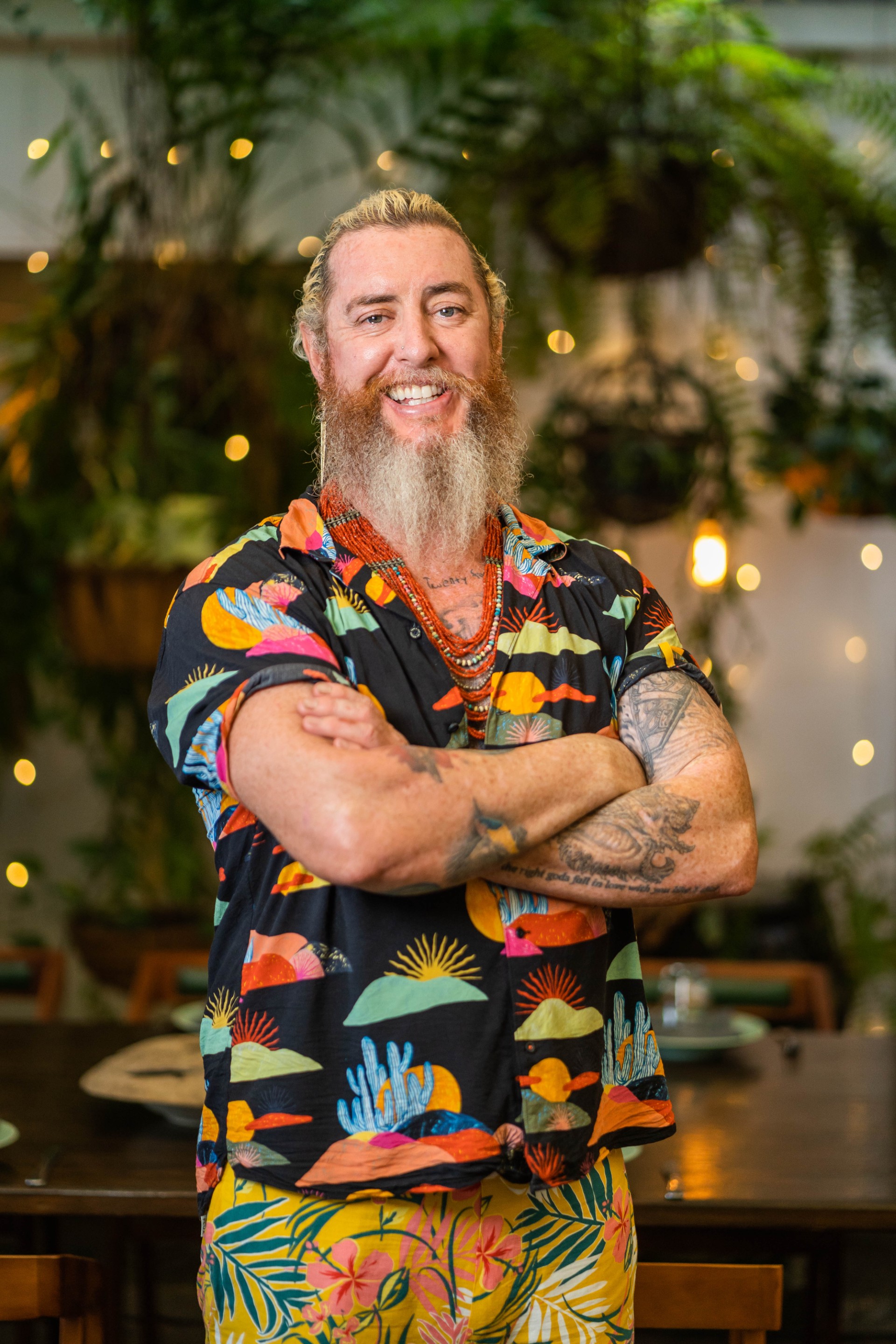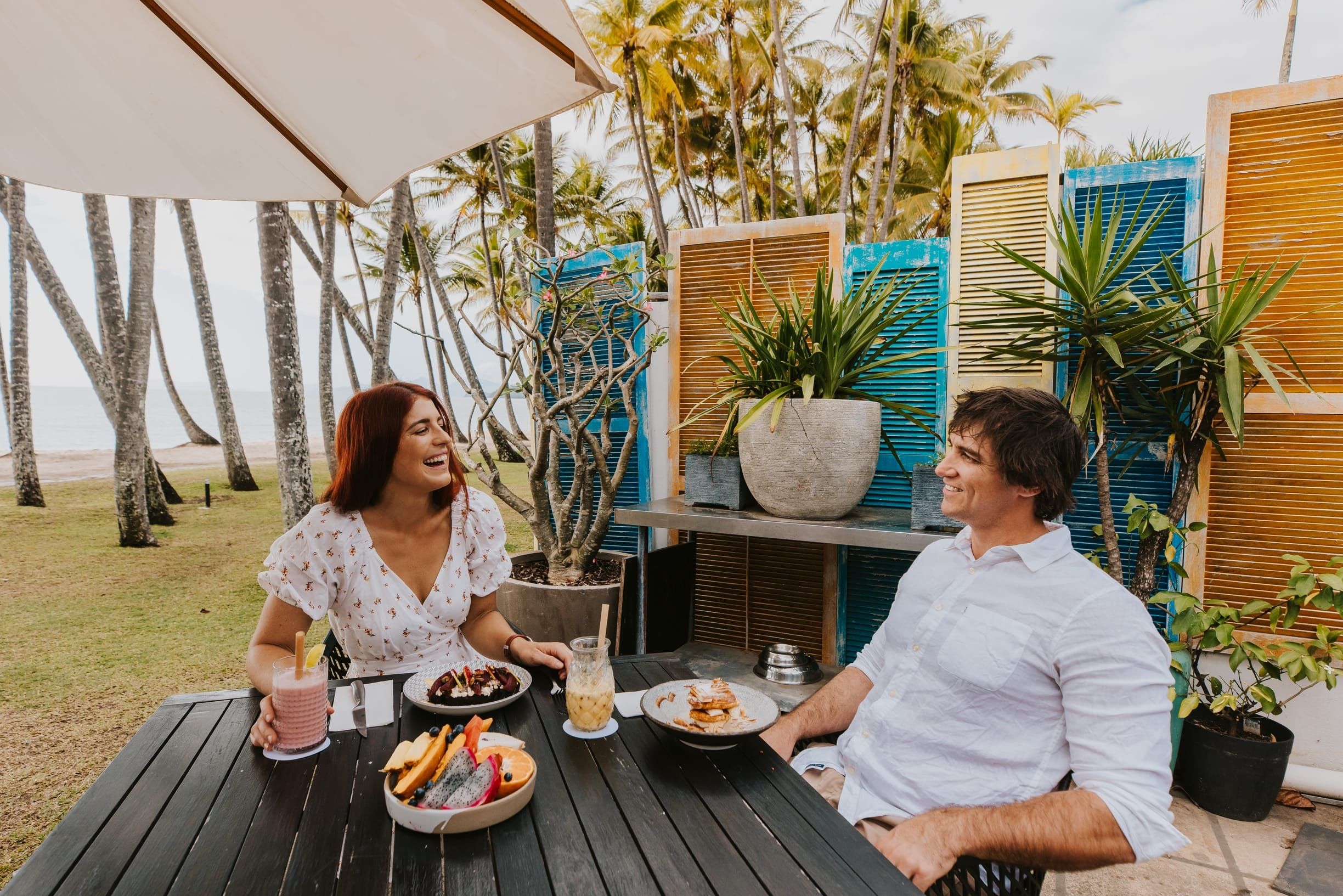A local’s guide to sustainable dining on the Great Barrier Reef with Nu Nu Restaurant's Nick Holloway
Feature
By Jemma Fletcher
From the reef to the rainforest, the iconic Nu Nu Restaurant in Palm Cove is renowned for showcasing the bounty of fresh produce of Cairns & Great Barrier Reef.
Bringing together beachfront views, award-winning Australian cuisine and impressive sustainable and local values, it's one of the best spots in North Queensland to taste the tropics.
Here we dive into the catch-and-cook philosophy in action with head chef and co-owner, Nick Holloway.
You've travelled, cooked and eaten all over the world – what's so special about Queensland and the fresh produce of the Great Barrier Reef?

It’s a long-standing view of mine that Tropical North Queensland is the Garden of Eden, and its biodiversity and unique geography give rise to a wealth of ingredients – many of which I'd never even encountered before I moved here 20 years ago.
This makes the Great Barrier Reef and beyond such an exciting place to work and cook. It's what has kept me here for so long. The fact I still go to Rusty's Market every Friday morning, and I’m surprised and delighted by new products I haven’t seen before, is great.
I don't put the restaurant menu or my desire to cook a particular thing, first. Growing up, we had quite an extensive vegetable garden and my mum was a massive advocate for saying ‘You don't go to the cookbook first and then see if there's any eggplant in the garden. You go to the garden first to see what you've got and then figure out how you're going to manage it.’ And that's the way I look at the food we serve in general. Every day is an opportunity to play, experience and cook new ingredients.
We've always said, let’s only have local line-caught fish on our menu because I want us to celebrate the catch of the day, whatever that catch may be, rather than force fishermen to go and catch a particular species. I believe this is what my customers want, and I try to educate my customers that today we have this beautiful fish, and it might not be as good in your mind as coral trout for example, but it's the best in the region today. We have to educate the public to do away with these notions that there's only one idea of great because that’s not true. For example, all fish doesn’t have to be flaky, because otherwise, you’ll end up with the same product being shared everywhere.
Unique experiences give you a time and place and that's what we want our guests to experience at Nu Nu Restaurant. When you eat our fresh produce or catch of the day, there’s a real sense of time and place that you’ve come to Tropical North Queensland and you’re experiencing it through flavours. I want you to feel genuinely immersed in the landscape and go “Wow, I went to this place, and I had this amazing experience, and it was awesome. I tasted a fish I'd never heard of before." What if it’s a Rosy Jobfish one day? Incredible.
Travelling should be a thing of wonder so hopefully our guests come out and experience both Nu Nu Restaurant and the broader Tropical North Queensland landscape. We need to be open to new experiences and in doing so, I think we'll all live a much richer life.
From ocean to plate, how is sustainable seafood incorporated at Nu Nu Restaurant?
We only buy whole fish and we clean them ourselves – we’ve always done this at Nu Nu Restaurant for the last 20 years, and we have a fantastic relationship with our seafood supplier who has a number of fishermen who literally bring us the best of the day. We'll get a text very early in the morning to say what the fish is going to be that day, and this is passed along to the restaurant staff in the briefing before the day services begin, and we go about trying to enhance and celebrate the qualities of the product in front of us.
And that's really the way it works. It’s about celebrating diversity and celebrating old techniques of trying to use every single bit of the fish we buy, for example, roasting the bones heavily and making a broth for the base of a sauce, or smoking the heads and using all of the meat there. We look at this not just from the perspective that I'm the proprietor and it needs to be fiscally responsible, but also the desire that most cooks have – we genuinely don’t want to see wastage. None of us want to waste food, ever. We're always resourceful in seeking out every single possible piece of potential for the product, from the leaves, the roots, the stems, the bones, the brains, the scales, and the skin. All of it. Absolutely no waste. Sustainability for us, is as little wastage as possible.
However, when I can service this wonderful product in this way, this is largely achieved because of the relationships we have with our suppliers. It's a very one-to-one experience. When I left Melbourne 20 years ago, I always felt at arm's length to the produce, with a middleman approval door who would select on behalf of the farmer to provide us with products. But when I moved to Cairns, being such a regional outpost, everything was based on those networks and relationships which is what keeps me going back to the market relentlessly every Friday, no matter what, even though I probably don't need to anymore.
And because of those relationships, we'll chat about the weather and find out what's coming into the season, what's in the middle of the season, what's going out. I've had the same seafood supply for 20 years, the same fruit and veg supply for 20 years and those are the relationships I nurture and look after. So I think there's another element of sustainability too – it's our community, in the way we all work together. We're completely interwoven.
You're a member of Plastic Free Cairns – how is that built in at Nu Nu Restaurant?
Well, although it revolves around using as little plastic as possible, sometimes it’s unavoidable in an organisation of our size, so it's a continuous conversation about how we can do better. One thing that scares me sometimes about these conversations is virtue signalling and saying that we're one thing when we are not completely there yet. We try to actively make decisions to do the best we can, but we're not always everything.
For example, we're still glad wrapping and I'm sure other alternatives can be applied to small restaurants, but they don’t do the amount of covers we do. It's a tough one, but we're always looking for new angles and new ways to do things. We're not closed off, that's for sure. I totally understand that you can do all these like baby steps and build up to that level of perfection, but you've also got to be realistic about what you can manage and offer with your position.
We try to make smart decisions around storage using metal containers and being conscious of the fact that we live in a natural wonderland and it's part of our duty as a resident here to preserve it and look after it because it looks after us.
Each season on the Great Barrier Reef has its unique charm and Nu Nu Restaurant regularly changes the menu to suit – do you have a favourite dish?
The dishes change all the time, which I love. But what I love more is the notion of preserving and so when we cure and smoke parts of the fish that may otherwise be deemed to the rubbish bin, it gives me a great sense of joy.
Using beautiful local ingredients to smoke the fish gives it an extra bit of lifespan, and whatever that entails. I don't want to be manipulating my landscape to suit my menu.
And for anyone visiting the region, what's your favourite experience on the Great Barrier Reef and why?
I think anyone visiting needs to get out there on a boat to see first-hand the true natural wonder. One has to see it to believe it. The best way to be a custodian of the landscape is to get out and experience it.
How to protect the Great Barrier Reef









